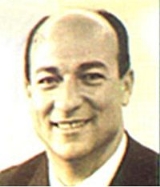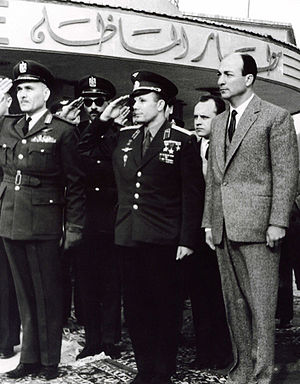
Zakaria Mohieddin
Encyclopedia
Zakaria Mohieddin was an Egyptian
military officer, politician, Prime Minister of Egypt and head of the first Intelligence body in Egypt, the Egyptian General Intelligence Directorate
.
In 1967 he was appointed by president Gamal Abdel Nasser
to take over position of president after Nasser's resignation, an appointment he refused.
In 1968, Mohieddin resigned from all positions and quit public life.
As of 2005, after the death of Hussein El-Shafei
, he and Khaled Mohieddin
were the last two surviving members of the Revolutionary Command Council.
.
In 1948 he was the chief of staff of the first brigade which was later besieged at Falouga. One of his outstanding achievements in 1948 was to go back to the besieged brigade, infiltrating enemy lines from Rafah to Faloga. He was rewarded for his bravery at the end of the war with the Mehmet Ali
golden award for valour and excellence in duty in the field in Palestine
. In 1952, he prepared strategy for army movement and was in charge of operation that led to success of the movement.

Egyptians
Egyptians are nation an ethnic group made up of Mediterranean North Africans, the indigenous people of Egypt.Egyptian identity is closely tied to geography. The population of Egypt is concentrated in the lower Nile Valley, the small strip of cultivable land stretching from the First Cataract to...
military officer, politician, Prime Minister of Egypt and head of the first Intelligence body in Egypt, the Egyptian General Intelligence Directorate
Egyptian General Intelligence Directorate
The General Intelligence Services , often called the Mukhabarat , is an Egyptian intelligence agency responsible for providing national security intelligence, both domestically and transnationally, with a counter-terrorism focus....
.
Overview
Mohieddin attended Military College in 1938 and was a Staff College Graduate in 1948. He was the Professional Army Professor of Tactics in the Officers Military College from 1940–1943 and again from 1950-1951. He was also the Professor of Tactics in the Officers Staff College from 1951–1952In 1967 he was appointed by president Gamal Abdel Nasser
Gamal Abdel Nasser
Gamal Abdel Nasser Hussein was the second President of Egypt from 1956 until his death. A colonel in the Egyptian army, Nasser led the Egyptian Revolution of 1952 along with Muhammad Naguib, the first president, which overthrew the monarchy of Egypt and Sudan, and heralded a new period of...
to take over position of president after Nasser's resignation, an appointment he refused.
In 1968, Mohieddin resigned from all positions and quit public life.
As of 2005, after the death of Hussein El-Shafei
Hussein el-Shafei
Hussein Mahmoud Hassan el-Shafei, , also known as Hussein el-Shafei , was a member of Egypt's July, 1952 revolutionary leadership council and served as vice-president under two former Egyptian presidents, Gamal Abdel Nasser and Anwar Sadat...
, he and Khaled Mohieddin
Khaled Mohieddin
Khaled Mohieddine was an Egyptian politician and a major in the Egyptian Army. He participated in the Egyptian Revolution of 1952, as a member of the Free Officers Movement, which overthrew the monarchy under King Farouk...
were the last two surviving members of the Revolutionary Command Council.
Military
Mohieddin had various assignments within the army. He served with the Egyptian army in SudanSudan
Sudan , officially the Republic of the Sudan , is a country in North Africa, sometimes considered part of the Middle East politically. It is bordered by Egypt to the north, the Red Sea to the northeast, Eritrea and Ethiopia to the east, South Sudan to the south, the Central African Republic to the...
.
In 1948 he was the chief of staff of the first brigade which was later besieged at Falouga. One of his outstanding achievements in 1948 was to go back to the besieged brigade, infiltrating enemy lines from Rafah to Faloga. He was rewarded for his bravery at the end of the war with the Mehmet Ali
Mehmet Ali
Mehmet Ali or Mehemet Ali is a Turkish given name for males. People with the name include:* Memet Ali Alabora, Turkish actor* Mehmet Ali Ağca, Turkish assassin* Mehmet Ali Aybar, Turkish sprinter* Mehmet Ali Birand, Turkish journalist...
golden award for valour and excellence in duty in the field in Palestine
Palestine
Palestine is a conventional name, among others, used to describe the geographic region between the Mediterranean Sea and the Jordan River, and various adjoining lands....
. In 1952, he prepared strategy for army movement and was in charge of operation that led to success of the movement.
Positions held

- 1952-1956 - Member of Egyptian Revolutionary Command CouncilEgyptian Revolutionary Command CouncilThe Revolutionary Command Council was the body established to supervise Egypt and Sudan after the Revolution of 1952. It initially selected Ali Maher Pasha as Prime Minister, but forced him to resign after conflict over land reform. At that time, the Council took full control of Egypt...
. - 1952-1955 - In charge of the first Intelligence body the Egyptian General Intelligence DirectorateEgyptian General Intelligence DirectorateThe General Intelligence Services , often called the Mukhabarat , is an Egyptian intelligence agency responsible for providing national security intelligence, both domestically and transnationally, with a counter-terrorism focus....
- 1953-1958 - Minister of Interior.
- 1958-1961 - Central Minister of Interior for Egypt and SyriaSyriaSyria , officially the Syrian Arab Republic , is a country in Western Asia, bordering Lebanon and the Mediterranean Sea to the West, Turkey to the north, Iraq to the east, Jordan to the south, and Israel to the southwest....
during U.A.R. - 1961-1962 - Minister of Interior.
- 1961-1968 - Vice President of EgyptVice President of EgyptThe Vice President of the Arab Republic of Egypt is a senior official within the Egyptian government. The position was created following the establishment of the republic in 1953....
. - 1965-1966 - Prime Minister and Minister of Interior.
Committees and boards
- Head of the High Commission for the High DamAswan DamThe Aswan Dam is an embankment dam situated across the Nile River in Aswan, Egypt. Since the 1950s, the name commonly refers to the High Dam, which is larger and newer than the Aswan Low Dam, which was first completed in 1902...
- Head of Egyptian Rowing Federation (1960–68)
- Head of Egyptian Greek Friendship Committee (1958–68)
- Member of the Board of the Officers Club (1951–52)
- Member of the High Committee of Socialist Arab Unity (the leading party or the only political party)
- Member of National Defense Committee.
Conferences attended
- Egypt delegation to UN - 1960
- African conference Addis AbabaAddis AbabaAddis Ababa is the capital city of Ethiopia...
- 1964 - Arab conference CasablancaCasablancaCasablanca is a city in western Morocco, located on the Atlantic Ocean. It is the capital of the Grand Casablanca region.Casablanca is Morocco's largest city as well as its chief port. It is also the biggest city in the Maghreb. The 2004 census recorded a population of 2,949,805 in the prefecture...
- 1965 - Bandong - 1965
- Signed NileNileThe Nile is a major north-flowing river in North Africa, generally regarded as the longest river in the world. It is long. It runs through the ten countries of Sudan, South Sudan, Burundi, Rwanda, Democratic Republic of the Congo, Tanzania, Kenya, Ethiopia, Uganda and Egypt.The Nile has two major...
treaty with SudanSudanSudan , officially the Republic of the Sudan , is a country in North Africa, sometimes considered part of the Middle East politically. It is bordered by Egypt to the north, the Red Sea to the northeast, Eritrea and Ethiopia to the east, South Sudan to the south, the Central African Republic to the...

